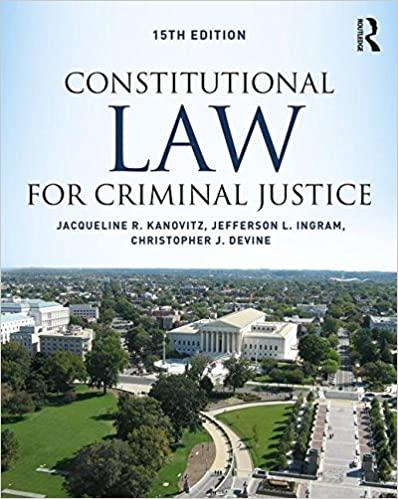Answered step by step
Verified Expert Solution
Question
1 Approved Answer
QUESTION 1 Which of the following is not a protected class under the Civil Rights Act of 1964? Sexual Orientation Color Sex Religion 10 points
QUESTION 1
- Which of the following is not a protected class under the Civil Rights Act of 1964?
- Sexual Orientation
- Color
- Sex
- Religion
10 points
QUESTION 2
- When a court looks at floor debates and committee reports at the time a statute was enacted to determine its meaning, they are applying the plain meaning rule of construction.
- True
- False
5 points
QUESTION 3
- Which is the most accurate statement regarding the holding inTarasoff v. Regents of the University of California?
- a.Bystanders have a duty to assist others who are in danger or hurt, and they are liable if they don't.
- b.Employers have a duty to assist employees who are hurt on the job, even if the employer did not cause the injury.
- c.A therapist whose patient discloses an intention to harm a specifically identified third party has a duty to warn that third party.
- d.Bystanders are civilly liable if they fail to warn the another person about an impending threat.
5 points
QUESTION 4
- Courts will interpret a statute by looking at its legislative history before using the plain meaning rule or before examining public policy.
- True
- False
5 points
QUESTION 5
- Controls on administrative agency power come from
- a.enabling legislationb.controls on fundingc.judicial reviewd.all of the above
5 points
QUESTION 6
- A bystander generally has no duty to assist a victim, but cases have altered this general rule when a special relationship between the parties exists.
- True
- False
5 points
QUESTION 7
- If the House and the Senate pass two different versions of a bill, a Conference Committee is charged with resolving the differences and reaching a compromise bill.That Conference Committee bill must then be voted on and approved by the House and the Senate before it can be sent to the President.
- True
- False
5 points
QUESTION 8
- An agency may conduct hearings before an administrative law judge or hearing officer.
- True
- False
5 points
QUESTION 9
- Which of the following is FALSE about our state and federal governments?
- a.The President is the chief executive of the federal government and the Governor is the chief executive of the state government.b.The General Assembly is the name of the Connecticut legislature; Congress refers to the federal legislature.c.There is no state judicial branch; only federal courts exist in Connecticut.d.Both the state and federal legislatures are bicameral bodies that consist of a House of Representatives and a Senate.
5 points
QUESTION 10
- Administrative agencies act in a quasi-judicial manner in enacting regulations or rules.
- True
- False
5 points
QUESTION 11
- An administrative agency may
- a.conduct investigationsb.issue subpeonasc.conduct warrantless searches in some highly regulated industriesd.all of the above
5 points
QUESTION 12
- Which of the following is INCORRECT?
- As it goes through Congress, a bill can be amended: (Hint:Think of the bill that created the Civil Rights Act.)
- a.On the floor of the House
- b.On the floor of the Senate
- c.In a Conference Committee
- d.By the President, when the bill is sent to him for signing.
5 points
QUESTION 13
- Before a court will review an administrative agency's decision
- a.the appellant must not have exhausted all administrative remedies.b.the party bringing the appeal must be aggrieved by the agency decision.c.a new trial must occur so that all the evidence presented before the agency can be presented again to the court.d.All of the above.
5 points
QUESTION 14
- The judicial branch of government
- a.interprets the meaning of statutes passed by the legislatureb.reviews the decisions of lower courtsc.reviews actions taken by administrative agenciesd.All of the above
5 points
QUESTION 15
- Which of the following is a type or source of law?
- a.Constitutionb.Statutec.Court opiniond.All of the above are types or sources of law.
5 points
QUESTION 16
- Congress creates federal agencies through
- a.the Administrative Procedure Act.b.rulemaking.c.enabling legislation.d.All of the above.
5 points
QUESTION 17
- The U.S. Congress can override a presidential veto:
- a.by a majority vote of both houses (the House and the Senate)
- b.by a supermajority vote of both houses (the House and the Senate).
- c.Congress cannot override a presidential veto.
- d.the Privacy Act
5 points
QUESTION 18
- Although a court's judgment only affects the parties to the litigation, the court's decision affects future cases in that it acts as precedent in similar cases that come before it at a later date.
- True
- False
5 points
QUESTION 19
- The Privacy Act prohibits federal administrative agencies from maintaining any records of agency investigations about U.S. citizens.
- True
- False
5 points
QUESTION 20
- The Freedom of Information Act provides citizens access to information from an agency, but the exceptions to compliance include national security, criminal investigations and personnel matters.
- True
- False
Step by Step Solution
There are 3 Steps involved in it
Step: 1

Get Instant Access to Expert-Tailored Solutions
See step-by-step solutions with expert insights and AI powered tools for academic success
Step: 2

Step: 3

Ace Your Homework with AI
Get the answers you need in no time with our AI-driven, step-by-step assistance
Get Started


